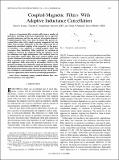Coupled-Magnetic Filters With Adaptive Inductance Cancellation
Author(s)
Lymar, Daria S.; Neugebauer, Timothy C.; Perreault, David J.
DownloadLymar coupled-magnetic.pdf (1.148Mb)
PUBLISHER_POLICY
Publisher Policy
Article is made available in accordance with the publisher's policy and may be subject to US copyright law. Please refer to the publisher's site for terms of use.
Terms of use
Metadata
Show full item recordAbstract
Conventional filter circuits suffer from a number of limitations, including performance degradation due to capacitor parasitic inductance and the size and cost of magnetic elements. Coupled-magnetic filters have been developed that provide increased filter order with a single magnetic component, but also suffer from parasitic inductance in the filter shunt path due to imperfectly-controlled coupling of the magnetics. In this paper, we introduce a new approach to coupled-magnetic filters that overcomes these limitations. Filter sensitivity to variations in coupling is overcome by adaptively tuning the magnetic circuit for minimum rms ripple performance with feedback based on the sensed filter output ripple. This active control enables much greater robustness to manufacturing and environmental variations than is possible in the conventional "zero-ripple" coupled-magnetic approach, while preserving its advantages. Moreover, the proposed technique also adaptively cancels the deleterious effects of capacitor parasitic inductance, thereby providing much higher filter performance than is achievable in conventional designs. The new technique is experimentally demonstrated in a dc-dc power converter application and is shown to provide high performance.
Date issued
2006-11Department
Massachusetts Institute of Technology. Department of Electrical Engineering and Computer ScienceJournal
IEEE Transactions on Power Electronics
Publisher
Institute of Electrical and Electronics Engineers (IEEE)
Citation
Lymar, Daria S., Timothy C. Neugebauer, and David J. Perreault. “Coupled-Magnetic Filters With Adaptive Inductance Cancellation.” IEEE Trans. Power Electron. 21, no. 6 (n.d.): 1529–1540. © 2006 IEEE
Version: Final published version
ISSN
0885-8993
1941-0107